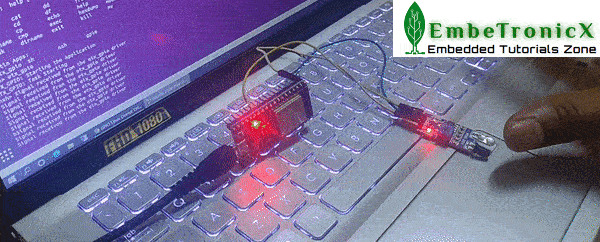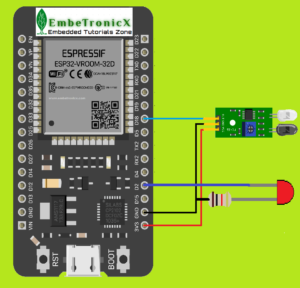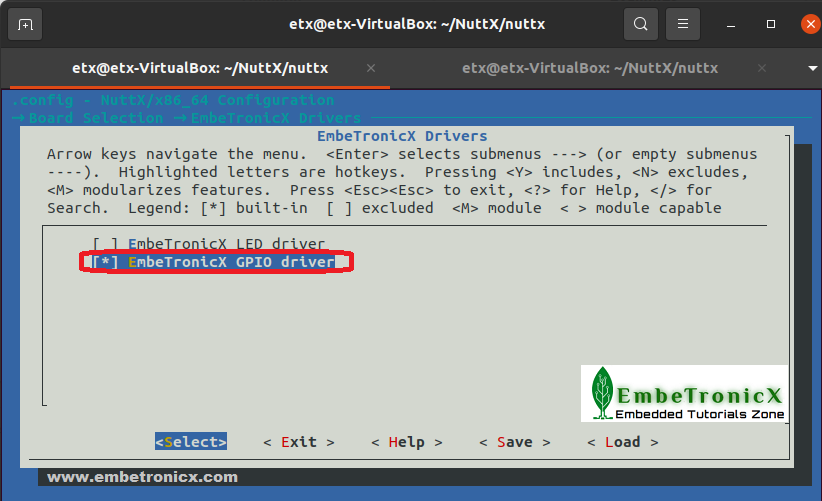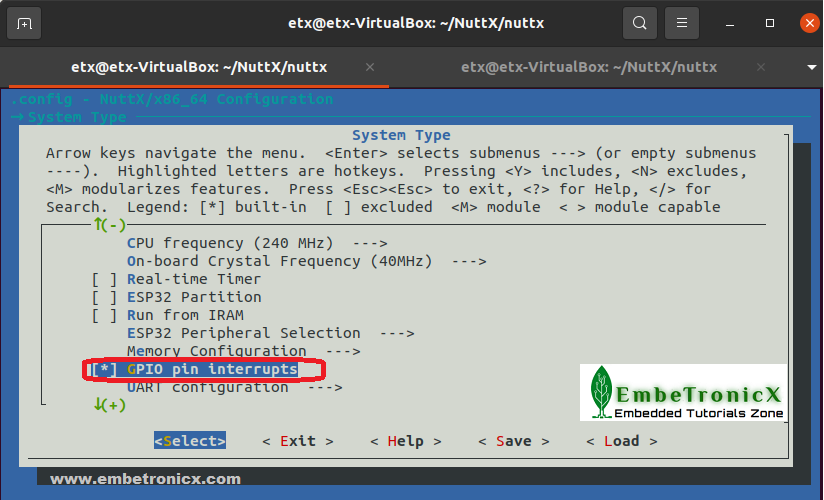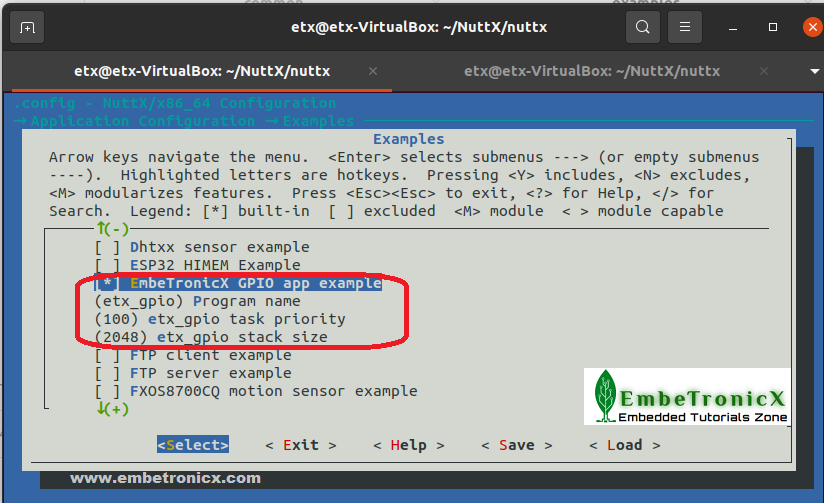This article is a continuation of the series on NuttX RTOS tutorials using the ESP32 Dev board and carries the discussion on NuttX RTOS and their usage. The aim of this series is to provide easy and practical examples that anyone can understand. In our previous tutorial, we saw how to use the GPIO as output. This is the ESP32 GPIO example using NuttX RTOS (GPIO Interrupt). In this tutorial, we will write our own driver and application to use the GPIO as both input and output.
You can also read the FreeRTOS Tutorials, ESP32 Intro, ESP32 IDF Getting Started, GPIO Linux Device Driver, STM32 RTOS Getting started, Boot sequence in Cortex-M4, and 8051 GPIO Tutorial.
Table of Contents
ESP32 GPIO example using NuttX RTOS (GPIO Interrupt)
Prerequisites
To continue with this tutorial, you must have configured the ESP32 toolchain and compiled the NuttX RTOS. If you aren’t configured anything yet, we suggest you to set up the esp32 using the below-given tutorials.
- GPIO Understanding
- Setup NuttX RTOS with ESP32
- Blinky Example (No Coding Required)
- Blinky Example (Coding required)
Hardware Required
- ESP32 Dev board
- Laptop machine (Host System)
- LED with Resistor (If you don’t have onboard LED)
- Any digital input device like a switch, Button, etc. In this example, we have used an IR sensor.
Connection Diagram – ESP32 GPIO example
In this example, we have used ESP32 Pin 18 as an Input pin and Pin 2 as an output pin. So, LED has been connected to Pin 2 and the IR sensor has been connected to Pin 18. Refer to the below connection diagram. You can also connect any digital input device instead of this IR sensor.
|
|
|
Concept of this Driver and Application
In this example, we have used two GPIOs (PIN2 and PIN18). The concept is very simple. When the IR sensor detects any objects in front of it, it will toggle the LED. Refer to the output image for better understanding.
Writing GPIO driver
In the last LED driver code, we have just created open(), close(), write() functions in the driver. But now we need read() and ioctl() functions also. If you are not familiar with the IOCTL function, please read the Linux device driver’s IOCTL. That will give you some idea about the IOCTL. And also in this tutorial, we are going to send the signal from the driver to the application. So, I recommend you to go through this Linux Device Driver’s Signal also to easily understand the concept.
The driver code is pretty simple. We are registering the GPIOs using the IOCTL. If it is an input GPIO and needs interrupt, then we are getting the application’s PID and register the ISR. When the interrupt hits (IR sensor detects anything), we are sending the signal to the application using that PID number that we have got it from the IOCTL.
If it is an output GPIO, then we just configure that GPIO as output and change the GPIO state in the write function. Once you are done with the GPIOs, then you can just unregister the GPIOs using the IOCTL.
We are going to create a file under /dev/. In our example, our driver will create the /dev/etx_gpio file.
|
|
|
First, let’s see the code below.
esp32_etx_gpio.c
I have added this file to the nuttx/boards/xtensa/esp32/common/src/.
/****************************************************************************
* boards/xtensa/esp32/common/src/esp32_etx_gpio.c
*
* Licensed to the Apache Software Foundation (ASF) under one or more
* contributor license agreements. See the NOTICE file distributed with
* this work for additional information regarding copyright ownership. The
* ASF licenses this file to you under the Apache License, Version 2.0 (the
* "License"); you may not use this file except in compliance with the
* License. You may obtain a copy of the License at
*
* http://www.apache.org/licenses/LICENSE-2.0
*
* Unless required by applicable law or agreed to in writing, software
* distributed under the License is distributed on an "AS IS" BASIS, WITHOUT
* WARRANTIES OR CONDITIONS OF ANY KIND, either express or implied. See the
* License for the specific language governing permissions and limitations
* under the License.
*
****************************************************************************/
/****************************************************************************
* Included Files
****************************************************************************/
#include <nuttx/config.h>
#include <stdint.h>
#include <stdbool.h>
#include <debug.h>
#include <assert.h>
#include <nuttx/board.h>
#include <arch/board/board.h>
#include <nuttx/arch.h>
#include <nuttx/irq.h>
#include <arch/irq.h>
#include <nuttx/signal.h>
#include "esp32-devkitc.h"
#include "esp32_gpio.h"
#include "esp32_etx_gpio.h"
#ifdef CONFIG_ESP32_ETX_GPIO
#define INVALID_GPIO 0xFF //invalid GPIO
/****************************************************************************
* Private Function Prototypes
****************************************************************************/
/* Character driver methods */
static int etx_gpio_open(FAR struct file *filep);
static int etx_gpio_close(FAR struct file *filep);
static ssize_t etx_gpio_write(FAR struct file *filep, FAR const char *buffer,
size_t buflen);
static ssize_t etx_gpio_read(FAR struct file *filep, FAR char *buffer,
size_t len);
static int etx_gpio_ioctl(FAR struct file *filep, int cmd, unsigned long arg);
/****************************************************************************
* Private Data
****************************************************************************/
struct sigevent event = { 0 };
pid_t pid;
static const struct file_operations etx_gpio_fops =
{
etx_gpio_open, /* open */
etx_gpio_close, /* close */
etx_gpio_read, /* read */
etx_gpio_write, /* write */
NULL, /* seek */
etx_gpio_ioctl, /* ioctl */
NULL, /* poll */
#ifndef CONFIG_DISABLE_PSEUDOFS_OPERATIONS
NULL /* unlink */
#endif
};
/****************************************************************************
* Private Functions
****************************************************************************/
/****************************************************************************
* Name: etx_gpio_ISR
*
* Description:
* Interrupt Service Routine.
****************************************************************************/
static int etx_gpio_ISR(int irq, void *context, void *arg)
{
if ( pid )
{
struct sigevent signal;
signal.sigev_notify = SIGEV_SIGNAL;
signal.sigev_signo = ETX_GPIO_SIGNO;
signal.sigev_value.sival_int = 1;
/* send signal to the application */
nxsig_notification(pid, &signal, SI_QUEUE, NULL);
}
return OK;
}
/****************************************************************************
* Name: etx_gpio_open
*
* Description:
* Standard character driver open method.
*
* This function will be getting called when the application
* opens the "/dev/etx_gpio" file.
****************************************************************************/
static int etx_gpio_open(FAR struct file *filep)
{
int ret = 0;
return ( ret );
}
/****************************************************************************
* Name: etx_gpio_close
*
* Description:
* Standard character driver close method.
*
* This function will be getting called when the application
* closess the "/dev/etx_gpio" file.
****************************************************************************/
static int etx_gpio_close(FAR struct file *filep)
{
int ret = 0;
return ( ret );
}
/****************************************************************************
* Name: etx_gpio_write
*
* Description:
* Standard character driver write method.
*
* This function will be getting called when the application
* writes data the "/dev/etx_gpio" file.
****************************************************************************/
static ssize_t etx_gpio_write(FAR struct file *filep, FAR const char *buffer,
size_t len)
{
DEBUGASSERT(buffer != NULL);
etx_gpio *gpio = (FAR etx_gpio *)((uintptr_t)buffer);
if( gpio->gpio_num < 0 || gpio->gpio_num > ESP32_NGPIOS )
{
syslog(LOG_ERR, "Write: Invalid GPIO Number - %d\n", gpio->gpio_num);
return ( len );
}
// Write to the GPIO
esp32_gpiowrite( gpio->gpio_num, *gpio->gpio_value );
return ( len );
}
/****************************************************************************
* Name: etx_gpio_read
*
* Description:
* Standard character driver read method.
*
* This function will be getting called when the application
* reads data from the "/dev/etx_gpio" file.
*
****************************************************************************/
static ssize_t etx_gpio_read(FAR struct file *filep, FAR char *buffer,
size_t len)
{
int ret = 0;
DEBUGASSERT(buffer != NULL);
etx_gpio *gpio = (FAR etx_gpio *)( (uintptr_t)buffer );
if( gpio->gpio_num < 0 || gpio->gpio_num > ESP32_NGPIOS )
{
syslog(LOG_ERR, "Read: Invalid GPIO Number - %d\n", gpio->gpio_num);
return ( ret );
}
*gpio->gpio_value = esp32_gpioread( gpio->gpio_num );
return ( ret );
}
/****************************************************************************
* Name: etx_gpio_ioctl
*
* Description:
* Standard character driver ioctl method.
*
* This function will be getting called when the application
* do IOCTL call to the "/dev/etx_gpio" file.
*
****************************************************************************/
static int etx_gpio_ioctl(FAR struct file *filep, int cmd, unsigned long arg)
{
int ret = 0;
etx_gpio gpio;
DEBUGASSERT( (FAR void *)arg != NULL );
//copy the GPIO struct
memcpy( &gpio, (FAR void *)arg, sizeof(etx_gpio) );
if( gpio.gpio_num < 0 || gpio.gpio_num > ESP32_NGPIOS )
{
syslog(LOG_ERR, "IOCTL: Invalid GPIO Number - %d\n", gpio.gpio_num);
return ( -1 );
}
switch( cmd )
{
case GPIOC_REGISTER:
{
if( gpio.gpio_type == ETX_GPIO_IN )
{
// Configure the GPIO as output
esp32_configgpio( gpio.gpio_num , INPUT );
}
else if( gpio.gpio_type == ETX_GPIO_OUT )
{
// Configure the GPIO as output
esp32_configgpio( gpio.gpio_num , OUTPUT );
}
else if( gpio.gpio_type == ETX_GPIO_IN_INT )
{
pid = getpid();
// Configure the GPIO as interrupt pin
int irq = ESP32_PIN2IRQ(gpio.gpio_num);
esp32_configgpio( gpio.gpio_num , INPUT_FUNCTION_3 | PULLUP );
ret = irq_attach(irq, etx_gpio_ISR, NULL);
if( ret >= 0 )
{
esp32_gpioirqenable(irq, ONHIGH);
}
}
else
{
// Invalid operation
ret = -1;
}
}
break;
case GPIOC_UNREGISTER:
{
/* Unregister the GPIO */
if( gpio.gpio_type == ETX_GPIO_IN_INT )
{
// unregister the interrupt pin
int irq = ESP32_PIN2IRQ(gpio.gpio_num);
esp32_gpioirqdisable(irq);
pid = 0;
}
}
break;
default:
ret = -1;
break;
}
return ( ret );
}
/****************************************************************************
* Public Functions
****************************************************************************/
/****************************************************************************
* Name: etx_gpio_driver_init
*
* Description:
* Initialize the EmbeTronicX GPIO device Driver.
* This will create the device file as "/dev/etx_gpio"
*
* return negative number on failure.
* return 0 on success.
*
****************************************************************************/
int etx_gpio_driver_init( void )
{
int ret = 0;
ret = register_driver("/dev/etx_gpio", &etx_gpio_fops, 0666, NULL);
if (ret < 0)
{
_err("ERROR: register_driver failed : /dev/etx_gpio : %d\n", ret);
ret = -1;;
}
return ( ret );
}
#endif /* CONFIG_ESP32_ETX_GPIO */
esp32_etx_gpio.h
I have added this file to the path nuttx/boards/xtensa/esp32/common/include/.
/****************************************************************************
* boards/xtensa/esp32/common/include/esp32_etx_gpio.h
*
* Licensed to the Apache Software Foundation (ASF) under one or more
* contributor license agreements. See the NOTICE file distributed with
* this work for additional information regarding copyright ownership. The
* ASF licenses this file to you under the Apache License, Version 2.0 (the
* "License"); you may not use this file except in compliance with the
* License. You may obtain a copy of the License at
*
* http://www.apache.org/licenses/LICENSE-2.0
*
* Unless required by applicable law or agreed to in writing, software
* distributed under the License is distributed on an "AS IS" BASIS, WITHOUT
* WARRANTIES OR CONDITIONS OF ANY KIND, either express or implied. See the
* License for the specific language governing permissions and limitations
* under the License.
*
****************************************************************************/
#ifndef __BOARDS_XTENSA_ESP32_COMMON_INCLUDE_ETX_GPIO_H
#define __BOARDS_XTENSA_ESP32_COMMON_INCLUDE_ETX_GPIO_H
/****************************************************************************
* Included Files
****************************************************************************/
#include <nuttx/config.h>
#include <sys/ioctl.h>
#ifdef __cplusplus
#define EXTERN extern "C"
extern "C"
{
#else
#define EXTERN extern
#endif
#define GPIOC_REGISTER _GPIOC(1) // IOCTL command to register
#define GPIOC_UNREGISTER _GPIOC(2) // IOCTL command to unregister
#define ETX_GPIO_SIGNO SIGUSR1 // Signal number
typedef enum
{
ETX_GPIO_IN, // GPIO as input
ETX_GPIO_OUT, // GPIO as ouput
ETX_GPIO_IN_INT // GPIO as input and enable the interrupt
} GPIO_TYPE;
typedef struct
{
GPIO_TYPE gpio_type; // GPIO type
uint8_t gpio_num; // GPIO number
uint8_t *gpio_value; // GPIO value
void *data; // Data
}etx_gpio;
/****************************************************************************
* Name: etx_gpio_driver_init
*
* Description:
* Initialize the EmbeTronicX gpio device Driver.
* This will create the device file as "/dev/etx_gpio"
*
* return negative number on failure.
* return 0 on success.
*
****************************************************************************/
#ifdef CONFIG_ESP32_ETX_GPIO
int etx_gpio_driver_init( void );
#endif
#undef EXTERN
#ifdef __cplusplus
}
#endif
#endif /* __BOARDS_XTENSA_ESP32_COMMON_INCLUDE_ETX_GPIO_H */
There is a function called etx_gpio_driver_init(), that is a starting point of the driver and it registers the driver and it creates the device file called /dev/etx_gpio. This function has to be called from somewhere initially. To do that, we are calling this function from the esp32_bringup.c.
|
|
|
I am adding the below code into the nuttx/boards/xtensa/esp32/esp32-devkitc/src/esp32_bringup.c‘s esp32_bringup() function.
#ifdef CONFIG_ESP32_ETX_GPIO
#include "esp32_etx_gpio.h"
#endif
#ifdef CONFIG_ESP32_ETX_GPIO
/* Register the EmbeTronicX GPIO Driver */
ret = etx_gpio_driver_init();
if (ret < 0)
{
syslog(LOG_ERR, "ERROR: etx_gpio_driver_init() failed: %d\n", ret);
}
#endi
Makefile
Now we have to build this driver. So, we have to add the below lines into the nuttx/boards/xtensa/esp32/common/src/Make.defs
ifeq ($(CONFIG_ESP32_ETX_GPIO),y) CSRCS += esp32_etx_gpio.c endif
Kconfig
Till now, we are ready with the GPIO driver. But if we add an option to enable/disable this driver during the build, it would be very good. So, to do that, I am adding the below lines into the nuttx/boards/xtensa/esp32/common/Kconfig.
config ESP32_ETX_GPIO
bool "EmbeTronicX GPIO driver"
default n
---help---
Enables the GPIO driver to control the GPIOs (ESP32).
This is added by the EmbeTroincX to demonstrate the
GPIO control using the ESP32 Dev board with NuttX.
This includes the EmbeTronicX GPIO driver which controls
the GPIO.
That’s all about the driver. Let’s write our application to access this driver. You can check the driver changes that I have added as part of this tutorial in the GitHub commit. And you can get the complete source code from GitHub.
Writing GPIO Application
In application, I am going to create a task called “ETX_GPIO” using the task_create() function. Then in the task, I am registering the GPIOs using the IOCTL call and registering the signal handler. So, whenever the Driver sends the signal, this signal handler will be triggered.
|
|
|
etx_gpio_app.c
I am creating a new directory called etx_gpio under apps/examples.
/****************************************************************************
* examples/etx_gpio/etx_gpio_app.c
*
* Licensed to the Apache Software Foundation (ASF) under one or more
* contributor license agreements. See the NOTICE file distributed with
* this work for additional information regarding copyright ownership. The
* ASF licenses this file to you under the Apache License, Version 2.0 (the
* "License"); you may not use this file except in compliance with the
* License. You may obtain a copy of the License at
*
* http://www.apache.org/licenses/LICENSE-2.0
*
* Unless required by applicable law or agreed to in writing, software
* distributed under the License is distributed on an "AS IS" BASIS, WITHOUT
* WARRANTIES OR CONDITIONS OF ANY KIND, either express or implied. See the
* License for the specific language governing permissions and limitations
* under the License.
*
****************************************************************************/
/****************************************************************************
* Included Files
****************************************************************************/
#include <nuttx/config.h>
#include <stdbool.h>
#include <stdlib.h>
#include <stdio.h>
#include <fcntl.h>
#include <sched.h>
#include <errno.h>
#include <sys/ioctl.h>
#include <nuttx/signal.h>
#ifdef CONFIG_EXAMPLES_ETX_GPIO
#define ETX_GPIO_DRIVER_PATH "/dev/etx_gpio" // GPIO Driver path
#define ETX_INPUT_GPIO_NUM 18 // Input GPIO number
#define ETX_OUTPUT_GPIO_NUM 02 // Output GPIO number
/****************************************************************************
* Private Data
****************************************************************************/
#define GPIOC_REGISTER _GPIOC(1) // IOCTL command to register
#define GPIOC_UNREGISTER _GPIOC(2) // IOCTL command to unregister
#define ETX_GPIO_SIGNO SIGUSR1 // Signal number
typedef enum
{
ETX_GPIO_IN, // GPIO as input
ETX_GPIO_OUT, // GPIO as ouput
ETX_GPIO_IN_INT // GPIO as input and enable the interrupt
} GPIO_TYPE;
typedef struct
{
GPIO_TYPE gpio_type; // GPIO type
uint8_t gpio_num; // GPIO number
uint8_t *gpio_value; // GPIO value
void *data; // Data
}etx_gpio;
static bool is_signal_received = false;
static etx_gpio gpio_in;
static etx_gpio gpio_out;
static uint64_t oldTime;
/****************************************************************************
* Private Functions
****************************************************************************/
/****************************************************************************
* Name: etx_signal_handler
****************************************************************************/
static void etx_signal_handler(int signo, FAR siginfo_t *info, FAR void *ucontext)
{
/* This if check is to eliminate the spurious interrupts.
** Added software debounce mechanism.
*/
if(( g_system_timer - oldTime ) > 20 )
{
oldTime = g_system_timer;
printf("Signal received from the etx_gpio driver\n");
is_signal_received = true;
}
}
/****************************************************************************
* Name: etx_gpio_task
****************************************************************************/
static int etx_gpio_task(int argc, char *argv[])
{
int ret = 0;
struct sigaction act = { 0 };
struct sigaction oact;
uint8_t gpio_in_val;
uint8_t gpio_out_val;
printf("ETX_GPIO: Task Starting\n");
int fd = open( ETX_GPIO_DRIVER_PATH, O_WRONLY);
if (fd < 0)
{
printf("ETX_GPIO:ERROR - Failed to open %s: %d\n", ETX_GPIO_DRIVER_PATH, errno);
ret = -1;
}
/* Register signal handler */
act.sa_sigaction = etx_signal_handler;
act.sa_flags = SA_SIGINFO;
sigemptyset(&act.sa_mask);
sigfillset(&act.sa_mask);
sigdelset(&act.sa_mask, ETX_GPIO_SIGNO);
ret = sigaction(ETX_GPIO_SIGNO, &act, &oact);
if (ret < 0)
{
int errcode = errno;
printf("ETX_GPIO: ERROR: sigaction failed: %d\n", errcode);
}
/* Register the Input GPIO */
gpio_in.gpio_type = ETX_GPIO_IN_INT;
gpio_in.gpio_num = ETX_INPUT_GPIO_NUM;
gpio_in.gpio_value = &gpio_in_val;
gpio_in.data = NULL;
if( ret >= 0 )
{
ret = ioctl(fd, GPIOC_REGISTER, (unsigned long)((uintptr_t)&gpio_in));
if (ret < 0)
{
int errcode = errno;
printf("ETX_GPIO: ERROR: GPIOC_REGISTER ioctl failed: %d\n", errcode);
}
}
/* Register the Output GPIO */
gpio_out.gpio_type = ETX_GPIO_OUT;
gpio_out.gpio_num = ETX_OUTPUT_GPIO_NUM;
gpio_out.gpio_value = &gpio_out_val;
gpio_out.data = NULL;
if( ret >= 0 )
{
ret = ioctl(fd, GPIOC_REGISTER, (unsigned long)((uintptr_t)&gpio_out));
if (ret < 0)
{
int errcode = errno;
printf("ETX_GPIO: ERROR: GPIOC_REGISTER ioctl failed: %d\n", errcode);
}
}
while( ret >= 0 )
{
if( is_signal_received == true )
{
//toggle the gpio val
gpio_out_val = !gpio_out_val;
//write the GPIO value to the driver
ret = write( fd, (const void*)&gpio_out, sizeof(gpio_out) );
is_signal_received = false;
}
usleep(50);
}
/* Unregister the GPIOs */
ret = ioctl(fd, GPIOC_UNREGISTER, (unsigned long)((uintptr_t)&gpio_in));
if (ret < 0)
{
int errcode = errno;
printf("ETX_GPIO: ERROR: GPIOC_UNREGISTER ioctl failed: %d\n", errcode);
ret = -1;
}
ret = ioctl(fd, GPIOC_REGISTER, (unsigned long)((uintptr_t)&gpio_out));
if (ret < 0)
{
int errcode = errno;
printf("ETX_GPIO: ERROR: GPIOC_UNREGISTER ioctl failed: %d\n", errcode);
ret = -1;
}
close(fd);
printf("ETX_GPIO: ERROR - Task finishing\n");
return EXIT_FAILURE;
}
/****************************************************************************
* Public Functions
****************************************************************************/
/****************************************************************************
* main
****************************************************************************/
int main(int argc, FAR char *argv[])
{
int ret;
printf("ETX_GPIO: Starting the Application\n");
ret = task_create( "ETX_GPIO", // Task Name
CONFIG_EXAMPLES_ETX_GPIO_PRIORITY, // Task priority
CONFIG_EXAMPLES_ETX_GPIO_STACKSIZE, // Task Stack size
etx_gpio_task, // Task function
NULL
);
if (ret < 0)
{
int errcode = errno;
printf("ETX_GPIO: ERROR: Failed to start ETX GPIO task: %d\n", errcode);
return EXIT_FAILURE;
}
return EXIT_SUCCESS;
}
#endif //#ifdef CONFIG_EXAMPLES_ETX_GPIO
Along with the etx_gpio_app.c, I am creating the three more files called Makefile, Make.defs, and Kconfig into the apps/examples/etx_gpio directory.
Makefile
############################################################################ # apps/examples/etx_gpio/Makefile # # Licensed to the Apache Software Foundation (ASF) under one or more # contributor license agreements. See the NOTICE file distributed with # this work for additional information regarding copyright ownership. The # ASF licenses this file to you under the Apache License, Version 2.0 (the # "License"); you may not use this file except in compliance with the # License. You may obtain a copy of the License at # # http://www.apache.org/licenses/LICENSE-2.0 # # Unless required by applicable law or agreed to in writing, software # distributed under the License is distributed on an "AS IS" BASIS, WITHOUT # WARRANTIES OR CONDITIONS OF ANY KIND, either express or implied. See the # License for the specific language governing permissions and limitations # under the License. # ############################################################################ include $(APPDIR)/Make.defs # ETX GPIO built-in application info PROGNAME = $(CONFIG_EXAMPLES_ETX_GPIO_PROGNAME) PRIORITY = $(CONFIG_EXAMPLES_ETX_GPIO_PRIORITY) STACKSIZE = $(CONFIG_EXAMPLES_ETX_GPIO_STACKSIZE) MODULE = $(CONFIG_EXAMPLES_ETX_GPIO) # ETX GPIO Example MAINSRC = etx_gpio_app.c include $(APPDIR)/Application.mk
Make.defs
############################################################################ # apps/examples/etx_gpio/Make.defs # # Licensed to the Apache Software Foundation (ASF) under one or more # contributor license agreements. See the NOTICE file distributed with # this work for additional information regarding copyright ownership. The # ASF licenses this file to you under the Apache License, Version 2.0 (the # "License"); you may not use this file except in compliance with the # License. You may obtain a copy of the License at # # http://www.apache.org/licenses/LICENSE-2.0 # # Unless required by applicable law or agreed to in writing, software # distributed under the License is distributed on an "AS IS" BASIS, WITHOUT # WARRANTIES OR CONDITIONS OF ANY KIND, either express or implied. See the # License for the specific language governing permissions and limitations # under the License. # ############################################################################ ifneq ($(CONFIG_EXAMPLES_ETX_GPIO),) CONFIGURED_APPS += $(APPDIR)/examples/etx_gpio endif
Kconfig
#
# For a description of the syntax of this configuration file,
# see the file kconfig-language.txt in the NuttX tools repository.
#
config EXAMPLES_ETX_GPIO
tristate "EmbeTronicX GPIO app example"
default n
depends on ESP32_ETX_GPIO
---help---
Enable the EmbeTronicX GPIO app example
if EXAMPLES_ETX_GPIO
config EXAMPLES_ETX_GPIO_PROGNAME
string "Program name"
default "etx_gpio"
---help---
This is the name of the program that will be used when the NSH ELF
program is installed.
config EXAMPLES_ETX_GPIO_PRIORITY
int "etx_gpio task priority"
default 100
config EXAMPLES_ETX_GPIO_STACKSIZE
int "etx_gpio stack size"
default DEFAULT_TASK_STACKSIZE
endif
You can check the application changes that I have added as part of this tutorial in the GitHub commit. And you can get the complete source code from GitHub.
Building the driver and app
Let’s build our app and the driver together. I have created the build.sh shell script to combine all the required steps into one file.
build.sh
This build.sh has been added into the nuttx/ directory. You can get the build.sh from GitHub.
|
|
|
# !/bin/bash # A simple bash script to build the NuttX RTOS #export ESP32 env . $HOME/esp/esp-idf/export.sh if [ $1 -eq 1 ] then #distclean echo "Dist clean" make distclean #ESP32 configure echo "configuring ESP32 with NuttX RTOS" ./tools/configure.sh esp32-devkitc:nsh fi #menuconfig make menuconfig #make and flash make download ESPTOOL_PORT=/dev/ttyUSB0
The above script has one argument. If you pass 1, then it does distclean and initializes the board configs. If you pass other than 1, then it does only the make menuconfig and make.
I don’t want to do the distclean. So, just building the NuttX. Run the below command in NuttX/nuttx directory.
etx@etx-VirtualBox:~/NuttX/nuttx$. ./build.sh 0
When you run the above command, you should get the menuconfig window. In that menuconfig, we have to enable the etx_gpio driver and the etx_gpio_app application.
Just navigate to Board Selection —> EmbeTronicX Drivers —> and check (enable) the EmbeTroincX GPIO driver like the below image.
|
|
|
Then after that, enable the GPIO interrupts by navigating to Home —> System Type —> enable the GPIO pin interrupts like the below image.
Then let’s enable the GPIO app by navigating to Home —> Application Configuration —> Examples —> and enable the EmbeTronicX GPIO app example. Please refer to the below image.
That’s all. Let’s build the NuttX now.
|
|
|
Save and Exit the menuconfig and let it build. Once it is trying to connect, hold the BOOT button. Then it will start flashing.
Once you build and flashed it, you connect the device using the picocom using the picocom -b 115200 /dev/ttyUSB0 command.
Now you will get the NuttShell (nsh). Enter the ? or help command. You will get the etx_gpio app. Now run the etx_gpio app.
Output – ESP32 GPIO example using NuttX RTOS
Once booting is done, you run the application by entering etx_gpio. Now, if you press the button or place the object in front of the IR sensor, then the output LED should be toggled. Please check the below output image. I am placing my hand in front of the IR sensor, then the onboard LED is toggling.
|
|
|
This is a very basic example. You can just use this logic and develop any complex application. In our next tutorial, we will implement the I2C communication using the NuttX RTOS and ESP32.
You can also read the below tutorials.

Embedded Software | Firmware | Linux Devic Deriver | RTOS
Hi, I am a tech blogger and an Embedded Engineer. I am always eager to learn and explore tech-related concepts. And also, I wanted to share my knowledge with everyone in a more straightforward way with easy practical examples. I strongly believe that learning by doing is more powerful than just learning by reading. I love to do experiments. If you want to help or support me on my journey, consider sharing my articles, or Buy me a Coffee! Thank you for reading my blog! Happy learning!

